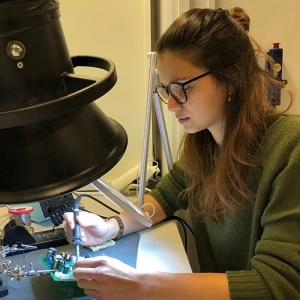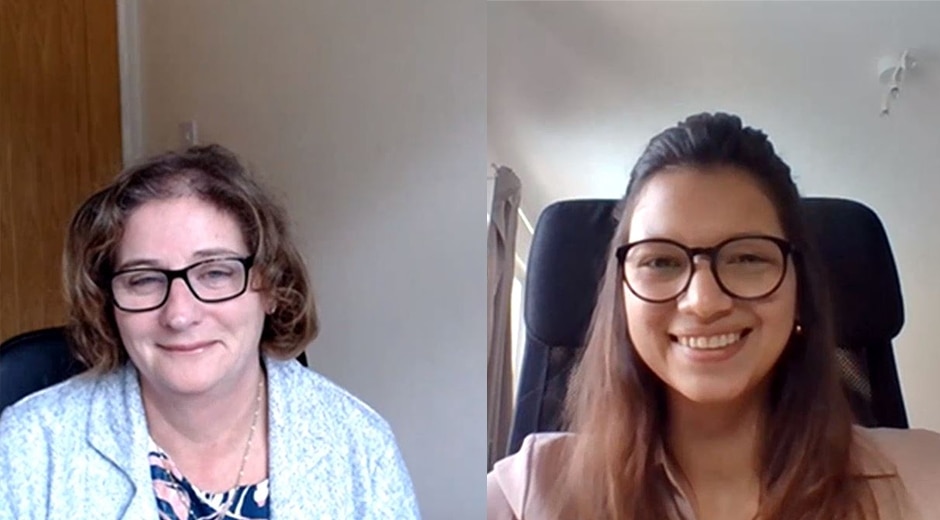On International Day of Women and Girls in Science, we’re showcasing two women thriving in ‘STEM’ roles at Electrolux and giving you the chance to win must-have tickets to a Women in Tech event.
According to UNESCO data* only around 30 per cent of all female students select STEM subjects (Science, Technology, Engineering and Maths) in higher education – with long-standing biases and gender stereotypes still steering girls and women away from science-related fields. United Nations’ International Day for Women and Girls in Science aims to change this narrative by celebrating women and girls in the field who are leading innovation.
Today we’re shining a spotlight on two inspirational women who work in STEM at Electrolux. Alison Bennett, VP Global Solutions at Electrolux who has worked in IT since the 1980s and at Electrolux since 2000 mentors Sonia Perez Caceres, Advanced Development Engineer who is starting out in her career after joining Electrolux two years ago via the Global Engineering Program. Find out why following your passion is key then get the chance to win tickets to virtual event Women in Tech Sweden!
Sonia: Hi Alison. I wonder how did you choose to work in IT?
Alison: I often get asked if I’m an IT professional by design or by chance and I would say by chance. I always wanted to be a nurse and I got a job as one and survived one week as I realized I didn’t want that at all. A careers officer explained to me that in life you have three careers: one you fall into, two you choose due to your passion and the third you consciously choose as it’s a life-long thing you always wanted to do. I had the basic skills to do IT, it was the better- paid job and best opportunity.
So this was a career I actually fell into by chance. Now it has become my passion so I’m on my career two. Career three is to be a teacher or solve crimes.
What made you choose your career path?
Sonia: I was influenced by my parents from a young age. They encouraged my natural curiosity. My Mum used to buy scientific toys for me to play with such as a telescope, microscope and an electronics kit and I really enjoyed it. And then when it was time to choose, I was thinking about the path that my friends were going down but then I knew there was this other side and I chose electronics engineering.
During your career what have been the challenges and opportunities you’ve experienced as a woman?
Alison: When I started out in the 80s, I chose a thing called computing and I really was the only woman. That in itself was a challenge. I went to a girls-only school then my first job I was in a totally male environment. The challenge was that it was a very aggressive environment and it was about being on top of your game and I was quite timid at the beginning. But it taught me the early lesson that you have to believe in yourself and everything is possible – you may fail but every failure is a learning.
I was lucky to have good bosses who were men that never treated me any differently. I was an equal. I had my place at the table. They were my mentors and helped me to adjust to that male-dominated world that I was living in.
As I’ve evolved my career, I’ve built my confidence. So when I’ve applied for roles I never thought about who I was up against, but more that I want this job. That’s where the passion comes in. It’s about making the opportunities your own.
For people starting out now I think they are more conscious of that divide between men and women. That wasn’t talked about when I started. The challenge now is get the right balance – yes those things are important but the only person who can grow your own career is you. Don’t rely on others. Your success is in your hands.

Sonia: That’s very powerful. When I look at my challenges, I’ve never faced discrimination that I knew of, but the one thing that has pulled me back is my own mind and self-awareness. The feeling of being intimidated.
Confidence seems to be key to pursuing a career within STEM. How can we encourage girls and young women to pursue their dreams instead of dropping off?
Alison: Some of it is how you’re brought up, for example culture and immediate family. I’m the youngest of five. My sister got married, had a career and gave it up. I was the first to have a family and go back to work. That’s a cultural change that has changed certainly in the UK.
We are seeing more women come through tech and engineering and it’s because of a wealth of choice more than ever before. You have to encourage them. You work for a long time. You’ve got to enjoy work. So if your passion is in STEM you should be encouraged to explore that passion.
I have one daughter and two boys and I treat them all the same. I tell them when choosing a career that if they like something enough they’ve got to go with it. If engineering is your passion then you’ll find your place. Follow your dreams.
Sonia: So personal influence is the best example?
Alison: Yes. I believe we consider the wrong things: It’s about good income, supporting family and the last thing is usually you and maybe we need to reverse that. Be in the driving seat all the time. Number one is important!
Sonia: When I went to school, I was in a group of 20 men and three girls. There’s a big difference there. But now I know to take the challenges as opportunities. Make it for yourself. Just don’t listen. That’s it.
Can you talk about a moment in your career where you’re most proud?
Alison: The very first time I took the opportunity to become a leader. I’d been very technical up until then. Again, it was something I thought “I can do this”. The interview was tough and really challenging but the person who interviewed me told me one of the things they really liked is “you were being you. You were speaking from the heart”. That was a wow moment and I reflect on that quite a lot.
Sonia: What tips do you have for pushing ahead in a career?
Alison: Be ambitious and take the knocks. A knock doesn’t mean the door is closed. Feedback is because they have observed something – you may not like it but sometimes the feedback that hurts is the best.
Networking is important. Build out beyond your immediate team and relationships. We have found in some areas of IT, we can’t find female candidates in the field full stop. That’s where networking is useful.
And mentoring. Have someone to bounce ideas around. Find someone even within your organization – just grab someone for an informal lunch or coffee. When you do that, that person feels good and you get a lot from that. One of my passions about Electrolux is you won’t find anyone saying no to catching up. It’s family-oriented.
Sonia: Thank you Alison. For me, I love working in STEM. The ability to imagine something and put it into action and solve a problem – that is satisfying. Discovering all the things you’re capable of.
Alison: Yes, we don’t like an IT crisis but when we have one, then we thrive on it. There is nothing more satisfying.
Sonia: Yes, finding that satisfaction – that’s beautiful.
Women in Tech Sweden
If you enjoyed this interview and want to learn more about working in the tech field, we are giving away two tickets to the hotly-anticipated digital event Women in Tech Sweden, March 10, sponsored by Electrolux. Tickets sold out in 150 seconds last year! Welcoming 3,500 techies in a virtual world, the event will highlight people, technology, innovations and collaborations that pave the way for a better future and inspire hope. There will be keynotes, breakout sessions, insights, learnings, inspiration as well as plenty of ways to network.
For your chance to attend online, all you have to do to apply is email eoc@electrolux.com explaining your passion for STEM and why you’d love to attend. Winners will be notified by the end of February.
* UNESCO data 2014-2016


